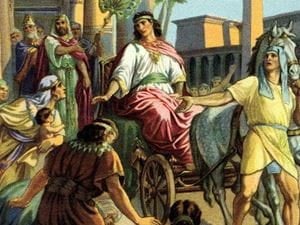
Public Domain/Wikimedia Commons
The story of Joseph is one of the most popular and well-known tales in the Bible. It is the final story in the book of Genesis and leads straight into the tale of Moses and the Exodus. The story of family strife, slavery, redemption, revenge and forgiveness has been made into a movie and a beloved musical. It also has been the subject of intense historical debate as it has been tied closely to a period of turmoil and mystery in Egyptian history.
Around 1720 B.C. a group of foreigners invaded the Egyptian kingdoms and set up a kingdom of their own in the Nile delta. The ancient Egyptians called these people “heqa-khaset” or “rulers [of] foreign lands,” an expression used to refer to almost any non-Egyptian peoples. The ancient Greeks, however, called these people “Hyksos” meaning “king shepherds,” an expression that was based on the Egyptian phrase but used for a specific group of people from the area surrounding the Nile. Where the Hyksos came from is a matter of debate that is of enormous interest to biblical historians because the Hyksos could be the missing link that cracks the mystery of both the story of Joseph and the tale of the Exodus wide open.Historians have wondered for decades how the Egyptians could forget a man like Joseph who, essentially, saved their entire civilization. How could the ancient Egyptians, who deified their dead pharaohs and held elaborate grieving rituals for the dead, forget a national hero so completely that they enslaved his descendants? Why did Joseph not appear in ancient Egyptian writings? The Hyksos invasion may answer those questions.
When the Hyksos invaded, they had the most advanced weaponry in the region. Their weapons of war included the composite bow, horse drawn chariot, improved battle axes and the battering ram. They were also capable of using far more advanced fortification techniques than were known in the area at the time. This would already have given them an advantage in their conquest, but to make matters worse, Egypt was in the middle of a period of intense turmoil and infighting. As such, the Hyksos were able to conquer a sizeable area of Egypt and set up a fortified capital in Avaris as well as a dynasty of their own. Eventually, the Hyksos lost control of the native Egyptian population. The Hyksos dynasty was destroyed, and the Hyksos and their allies who remained in Egypt were killed, enslaved or expelled from the Nile delta. Among those allies may have been the Israelites.
There are no records of a Hebrew named Joseph in ancient Egypt. The Egyptians, however, may not have been the people that Joseph saved. The Hyksos called their kings “pharaohs” as well, and they are believed to have come from Canaan or at least traveled through the area. As such, the Hyksos may have been familiar with the culture Joseph grew up in and willing to hear out a stranger who claimed to be able to interpret the king’s dreams. This would fit with what archeology has found in territories controlled by the Hyksos as there have been a number of artifacts uncovered in the area do not match Egyptian typology but do fit with what is found in Israel. When the Hyksos were defeated, the remaining Israelites were enslaved.
Since the Egyptians also had a habit of trying to erase people they did not like from history, such as the attempts to eliminate all mentions of Hatshepsut, the woman who was one of the most successful pharaohs in history, it is not out of the question for them to have decided to remove mentions of Joseph as well. This would also explain why the pharaoh in Exodus “knew not Joseph.” Joseph had been advising the Hyksos, not the Egyptians.
Other scholars claim the complete reverse. Joseph, they say, advised the Egyptians, but the Israelites were enslaved by the Hyksos. Ancient Egypt kept records of a man called Imhotep who, according to hieroglyphics found carved near Aswan, saved Egypt from a famine when the annual Nile floods failed seven years in a row. The story of Imhotep is very similar to that of Joseph in the Bible. If Imhotep was the same person as Joseph as some scholars suggest, then it may have been the Hyksos who enslaved the Israelites. As foreigners, they would not have known who Joseph was or of his importance.
One piece of evidence supporting this theory is, oddly enough, a grave robbery. A tomb from before the Hyksos invasion was found by archaeologists to have been robbed in ancient times. This in and of itself is not unusual. Grave robbing was, and still is, a good source of black market goods. What is strange is what was stolen. The grave robbers took the actual body from the tomb. While modern grave robbers might get a pretty penny for ancient bones, most grave robbers of old were interested in gold, silver and other burial treasures. They would have had no interest in the actual body of the person who was buried in the tomb. Some suggest, based on evidence including hieroglyphs and the Asiatic appearance of a broken statue, that the grave robbers were none but faithful Israelites who removed Joseph’s body to keep it safe from Hyksos who desecrated the tomb. This would then help explain why the Israelites could so easily gather up Joseph’s bones to take with them during the Exodus. They had already stolen the body. This would also be in keeping with the theory that Joseph and Imhotep were the same person as Imhotep was said to be deified by the Egyptians after his death, and the ancient Egyptians were known to build elaborate tombs for important people who died.
The Hyksos are often seen as nothing more than an interesting historical footnote in Egyptology, but they are of far greater interest for biblical scholars and historians. The appearance of this foreign people in Egypt may account for one of the greatest mysteries in the tale of Joseph and the story of the Exodus. Joseph was not remembered by the Israelites’ enslavers because the slavers never did know him. He may have saved a people, but it was not their people, and so they took his descendants as slaves until such time as God led his people out of Egypt and back to the land He had promised them so long ago.

